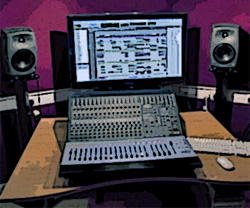
3) Eliminate Any Noises
Now is the time to clean up each individual track.
While the noises might not sound too bad with the rest of the track, after everything is mixed and mastered you’d be surprised how something that was buried can come to the forefront.
Also, by eliminating any extraneous noises, all the tracks magically sound distinct and uncluttered.
Trim the heads and tails – Trim all the extra record time at the beginning and end of each track, regardless of whether it was recorded during basics or overdubs.
Add a fade-in and fade-out to eliminate any edit noise.
Crossfade your edits – One of the biggest problems for A-list mixers is when they get a session in that’s full of edits to make the track sound tight, but the edits click and pop because they don’t contain any cross-fades.
Even if you can’t hear a click or pop, it’s a good practice to have a short cross-fade on every edit to eliminate the possibility of an unwanted noise.
Delete extra notes from Midi tracks – Delete any extra “split” notes that were mistakenly played. You might not hear them when all the instruments are playing, but just like the noise at the beginning of tracks, they have a tendency to come to the forefront after things get compressed.
4) Do Any Necessary Comping
Comping shouldn’t be left for mixing as it’s something that’s normally taken care of directly after an overdub session for either the vocal, guitar or anything else that required multiple takes. That being said, if you still have some vocal or overdub comping to do, now’s the time.
5) Do Any Necessary Tuning
Inevitably there’s always a note that’s a bit sour and needs tuning. Whether you use Autotune, Elastic Audio, or any other pitch correction plug-in, make sure that the timing isn’t thrown off when the note is shortened or lengthened.
This is an excerpt from Bobby’s recently published book “Mixing And Mastering With T-RackS: The Official Guide.” In it, he covers the 3 main facets of preparing for a mix, the technical prep, the setup prep, and the physical prep.
Bobby Owsinski is an author, producer, music industry veteran and technical consultant who has written numerous books covering all aspects of audio recording. For more information be sure to check out his website and blog.
